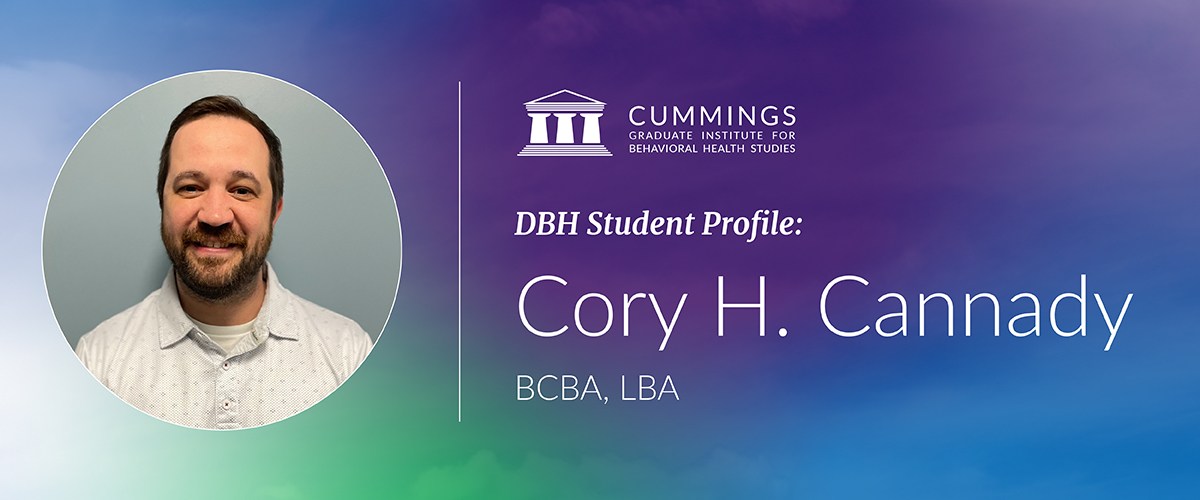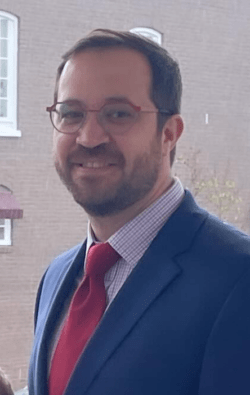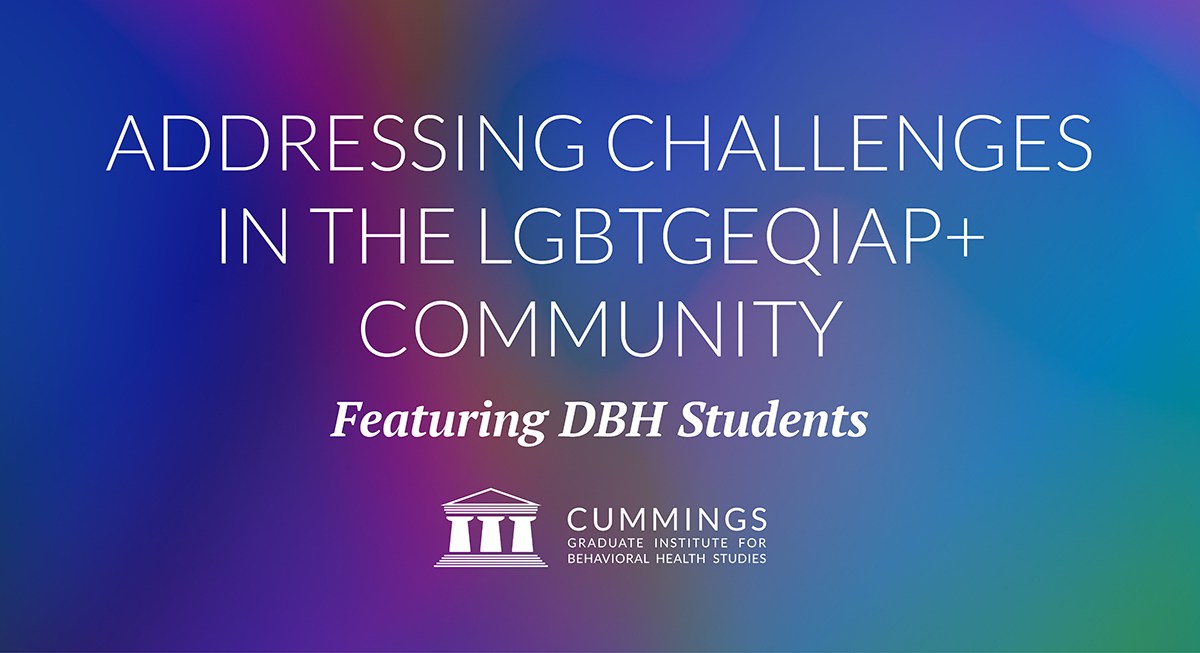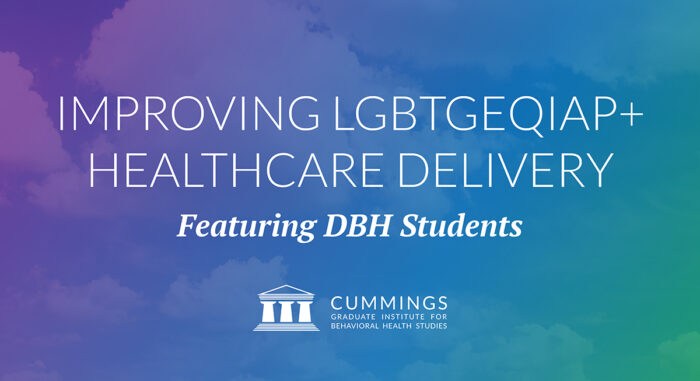 From Educator to Innovator: Cory H. Cannady’s Insights on Professional and Personal Growth through the DBH Program
From Educator to Innovator: Cory H. Cannady’s Insights on Professional and Personal Growth through the DBH Program
March 13, 2024
Get to know Cory H. Cannady, Doctor of Behavioral Health (DBH) candidate at Cummings Graduate Institute for Behavioral Health Studies, Board Certified Behavior Analyst, and the Assistant Clinical Director at Elevate Behavior Services in Chattanooga, TN. Originally from a small town in west Tennessee, he made the move to Chattanooga in 2009 to pursue his undergraduate studies at the University of Tennessee at Chattanooga. After earning his bachelor degree in Secondary English Education, Cory dedicated five years to teaching middle school. While teaching, he concurrently pursued and obtained a master’s degree in Applied Behavioral Analysis from the University of Cincinnati in 2017, achieving Board Certification and licensure in 2019. With an impressive career and educational background, Cory has evolved from an educator to a passionate Board-certified Behavior Analyst and future Doctor of Behavioral Health. Beyond his professional and educational endeavors, Cory shares his life with his husband, Cameron, and their 7-year-old son. In this interview, Cory reflects on his transformative journey in the DBH program, sheds light on the critical need for integration of physical and behavioral healthcare, and shares insights into the role of leadership in improving outcomes in the behavioral health sector.
How has the DBH program transformed your understanding of behavioral health, and in what ways has it influenced your career trajectory?
The Doctor of Behavioral Health (DBH) program has definitely transformed my understanding of behavioral health. Understanding the links between physical and mental health has taught how to make better treatment decisions. The DBH program has also given me insights that otherwise would not be possible and allows me to view individuals through a lens that I was previously ignorant of. This program has helped me grow into a more confident individual, provider, and parent.
What approaches or strategies can revolutionize the behavioral health landscape?
Behavioral health will see its largest change when integration between physical and mental health services has been achieved. No more unfollowed referrals, forgotten appointments, or people lost in the healthcare system. I keep wondering, “Why haven’t we done this sooner?” Many people are lost when their primary care provider says they cannot help because they do not know where to turn next. This alleviates that problem by offering services in the same location the PCP practices allowing for swift, effective behavioral health options.
 Reflecting on your DBH journey, what valuable insights or skills have you gained that have significantly contributed to your life and career?
Reflecting on your DBH journey, what valuable insights or skills have you gained that have significantly contributed to your life and career?
My now adoptive son, at the time our foster son, had endured a tremendous amount of trauma in his first five years of life. These classes allowed me to better understand him, his behavior, and his needs through a lens that was previously inaccessible due to ignorance and lack of knowledge. It is because of these classes in particular that I now know how to navigate his problematic behaviors and his needs that I otherwise would not be privy to. For this, I am ever grateful.
What are your future career goals within the behavioral health sector, and how will the DBH program contribute to your success?
My career goals are currently to continue working in the field of applied behavior analysis (ABA) as a board certified behavior analyst (BCBCA). However, not only will I care for patients, but I now know better ways to support my staff. The knowledge gained through the DBH program has helped me identify work-related stress symptoms and interventions to help buffer this stress before it becomes more significant. I continue to work on developing how my position and education can better benefit our company after obtaining my DBH.
What are your thoughts on the role of leadership in improving behavioral health outcomes, and how has the DBH program equipped you for leadership roles?
I think leadership is essential, but not all leaders know their potential. Someone is not made a leader by accident. A leader is someone who is looked up to, someone that can influence decisions, and someone that is respected. All of these qualities allow a leader to ask relevant questions and help make decisions for change, growth, and the betterment of a company and its stakeholders. The DBH program has equipped me to be a leader by allowing me opportunities for continued collaboration with colleagues and building a network within our cohort of other professionals from all different backgrounds. It has allowed me to be more confident when making difficult decisions about treatment because I can now view things from multiple perspectives I was previously unaware of. This program is just as wonderful as the professors who help pass their knowledge to us to expand the field of behavioral health and the health of those around us.
Cory H. Cannady’s journey from a small town in west Tennessee to the Doctor of Behavioral Health (DBH) program at Cummings Graduate Institute is a testament to his unwavering dedication to improving the lives of others and transformative growth. Through the DBH program, Cory has not only gained a deeper understanding of the links between physical and mental health but has also acquired invaluable insights that have shaped him into a more confident professional, provider, and parent. His reflections on the integration of physical and mental health services underscore the pressing need for a revolutionary shift in the behavioral health landscape. Cory’s journey is not just about personal and professional growth. His story serves as a reminder of the positive impact one individual can make in the quest for better care, improved outcomes, and a truly integrated healthcare system.
Connect with Cory H. Cannady
Instagram: @huntercannady
LinkedIn: Cory Cannady
Elevate Behavior Services, LLC: https://elevatebehavior.com/
Explore Cory H. Cannady’s Research
Suicidology Among First Responders: A Literature Review of Causal and Protective Factors
Prevalence of Suicide Among First Responders Suicide is the 10th leading cause of death for Americans of any age claiming the lives of 47,000 people in 2017 (Vigil et al., 2020). Suicidal ideation, suicide attempts, and completed suicide, however, are at a significantly and disproportionately higher rate among first responders including law enforcement officers, firefighters, and emergency medical personnel (Aldrich & Cerel, 2022; Ringer et al., 2021; Stanley et al., 2019; Streeb et al., 2019). Among these, firefighters are at the highest risk for suicide compared to the other professions (Streeb et al., 2019). This may be attributed to many different factors that will be discussed later.
 Health, Mental Health, and Barriers to Care for the LGBTQ Population
Health, Mental Health, and Barriers to Care for the LGBTQ Population
LGBTQ Community Health
The health and mental health of lesbian, gay, transgender, and queer/questioning (LGBTQ) populations is affected by multiple factors, many of which being unique to this population. The number of LGBTQ persons in America is found to be between 2-3% of the total population (Romanelli & Hudson, 2017); however, this population remains underserved or ill served by the healthcare industry (Romanelli & Hudson, 2017). The causes for these health disparities are numerous and ever changing as research delves deeper into specific health concerns and causality.
Check Out Cory H. Cannady on the Disruptors at Work Podcast
 Disruptors at Work: an Integrated Care Podcast, Season 2, Episode 7: Ask a DBH: Addressing Challenges in the LGBTGEQIAP+ Community, featuring:
Disruptors at Work: an Integrated Care Podcast, Season 2, Episode 7: Ask a DBH: Addressing Challenges in the LGBTGEQIAP+ Community, featuring:
- Jeremy Henderson-Teelucksingh, MHR, M.A., LPC/MHSP, NCC/CCMHC
- Brandy K. Biglow, LMHC, CCTP, QS
- Cory H. Cannady, BCBA, LBA
 Disruptors at Work: an Integrated Care Podcast, Season 2, Episode 3: Ask a DBH: Improving LGBTGEQIAP+ Healthcare Delivery, featuring:
Disruptors at Work: an Integrated Care Podcast, Season 2, Episode 3: Ask a DBH: Improving LGBTGEQIAP+ Healthcare Delivery, featuring:
- Brandy K. Biglow, LMHC, CCTP, QS
- Cory Cannady, BCBA, LBA
- Shelly Espejo, LPC
- Jeremy Henderson-Teelucksingh, MHR, M.A., LPC/MHSP, NCC/CCMHC






























